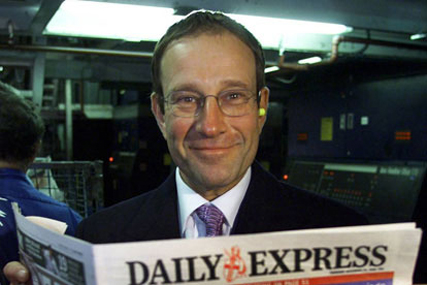Yesterday was Desmond’s first full day of ownership, and Northern & Shell’s editorial director Paul Ashford told senior Five staff that the key to the acquisition was the group's desire to exploit the capabilities of the company’s celebrity magazines, to "underwrite, create and produce" programmes with a new generation of stars.
On Friday, German-based broadcaster RTL sold Five to Desmond for £103.5m. Ownership passed to Desmond immediately and he agreed to shoulder any regulatory responsibilities.
The deal is not expected to face any Ofcom hurdles, although a spokesman for the Office of Fair Trading stressed it was "too early" to say whether the acquisition required investigation.
The purchase was described as "encouraging" by Culture Secretary Jeremy Hunt on Sunday (25 July).
The minister, in an interview on BBC One's 'Andrew Marr Show', said: "What I think is encouraging is that one of the first things that Richard Desmond said, was that he was committed to Channel 5's future as a public service broadcaster.
"If you look at popular programmes on Channel 5 like 'CSI', like 'Grey’s Anatomy', I think fans of those series will be pleased that it's got an owner who is committed to Channel 5's future."
Desmond has confirmed he saw off competition from three rival bidders – Channel 4, Time Warner and Endemol – to purchase the channel from RTL.
After securing the deal through Northern & Shell, Desmond promised to deliver a new and better era for television in the UK.
Hunt also indicated the BBC licence fee needed to be overhauled in an era when many people watched programmes over the internet.
The acquisition has attracted a cautious response from media agencies.
Andy Benningfield, broadcast director at WPP media agency Maxus, said: "Although he may not be universally popular, Desmond could be a white knight. His businesses will prove fruitful for Five, although he will undoubtedly drive Five to a more populist format."
According to RTL's results for 2009, revenue at Five Group was £269m, down 21.1% from £341 in 2008, and operating earnings before the deduction of interest, tax and amortization (EBITA) were negative £10m, compared with positive £2m in 2008.
Benningfield said: "Five's struggle has seen a rapid decline in revenue performance relative to the market in the last two years. Recession and revenue declines aside, Five's share of total broadcast has dropped from 9.2% in 2008, to what we forecast as around 7.4% in 2010.
"The unprecedented growth in the market so far this year has seen all the major sales houses replace and exceed any revenue loss they experienced in 2009. Five, on the other hand, will only see a net gain of around £3m to offset against the £65m loss they endured last year."
One head of broadcast at a media agency who asked not to be named said: "Buying Five would not make sense for most people, as shareholders would keep any normal company on a tight rein. An individual can be a bit mad about these things."
Others were more positive about the deal's potential.
Phil Hall, head of TV at MediaCom, which holds the Northern & Shell account, said: "Our clients would welcome a stronger Five and there's no doubt that its new owner has the resources and the track record to improve the channel and stem the loss of advertiser investment."
Five's trading position was under increasing pressure after and earlier this month, leaving Five as the smallest player. The next round of TV trading will kick off in October.
Five's chief executive Dawn Airey told senior management yesterday that the Northern & Shell team would spend several weeks getting to know the business before making any decisions about its future direction, so it is unclear whether they will look to cross-sell multimedia ads.
Chris Locke, group trading director at Publicis agency StarcomMediaVest Group, said: "Desmond can cross-promote, but whether that will drive ad revenue I don’t know. The way clients spend in different media is different and clients might not want to spend in his newspapers.
"Five will be up against Channel 4 and Sky to put share back on and, by the same token, Four and Sky could leverage their scale now they have more channels. Five's in with a chance as Sky doesn’t always have the inventory, and you could say Four is overpriced."
It is the first time a newspaper proprietor has owned a public service broadcaster in the UK.
Chris Hayward, trading director at Publicis agency ZenithOptimedia said: "It will be interesting how the relationship develops and where the programming will go.
"I'm sure Desmond will try to use his influence. It will become overtly populist, but whether that's a good thing is entirely subjective."


